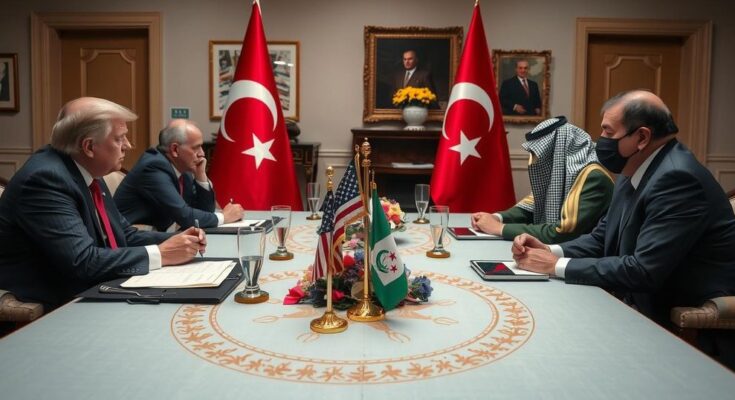U.S., Turkish, and Arab officials convened in Jordan to support a peaceful transition in Syria, expressing the need for an inclusive government while stressing the importance of avoiding chaos akin to Libya’s post-revolution turmoil. Concerns were raised about the influence of external powers, and the absence of Syrian representatives at the talks highlights the complexity of achieving lasting peace.
Officials from the United States, Turkey, and various Arab nations have convened in Aqaba, Jordan to endorse a peaceful transition in Syria. Jordanian Foreign Minister Ayman Safadi emphasized the regional consensus against the potential descent of Syria into chaos. U.S. Secretary of State Antony Blinken acknowledged direct communication with the rebel group Hayat Tahrir al-Sham (HTS), while stressing the need for a cohesive Syrian government that respects minority rights and averts any support for terrorist activities. Iraqi Foreign Minister Fuad Hussein articulated concerns regarding the future of Syria, urging regional stakeholders to prevent a trajectory akin to Libya’s post-Gaddafi turmoil. Turkish Foreign Minister Hakan Fidan highlighted the necessity of preserving and reforming existing Syrian institutions. Although HTS has professed a commitment to an inclusive government, doubts persist due to its violent history. While the discussions acknowledged key issues confronting Syria, the absence of representatives from the Assad regime and supporters like Iran and Russia underscores the complexity of the situation.
The ongoing conflict in Syria since 2011 has led to widespread violence and instability, complicating efforts for reconciliation and governance. External influence from global powers has exacerbated the situation, creating a landscape of shifting alliances and opposing interests. Recently, there has been a renewed focus on fostering a stable, inclusive governance structure in Syria to ensure representation for its diverse populace, a response to the urgent need for peace after years of civil strife. The recent talks were aimed at formulating a collaborative approach to prevent further deterioration of the situation and to address the humanitarian crisis resulting from the conflict.
In conclusion, the recent meeting in Jordan among U.S., Turkish, and Arab officials underscores a collective commitment to facilitating a peaceful transition in Syria. While optimism surrounds the potential for an inclusive governance structure, significant challenges remain, particularly given the complex dynamics of external influence and historical grievances. Without the participation of key stakeholders, including representatives of the Assad regime, the path to a unified and stable Syria remains fraught with uncertainty.
Original Source: www.bbc.com




